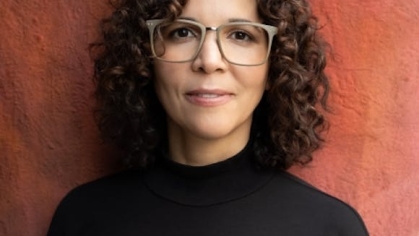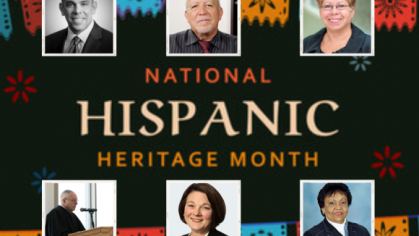Rutgers-Newark’s Advocates for Healthy Living Hosts 5-Week Virtual Health and Wellness Series
The novel coronavirus pandemic has disrupted life for everyone worldwide. With most people encouraged to stay home as much as possible to help slow the spread of the virus, inactivity and isolation can cause serious physical and mental health concerns. This is even more so with adults who are 65 years of age and older because the opportunity for many of them to engage in appropriate social-distancing activities like hiking and biking can be challenging.
To keep seniors moving, involved, and connected to others, Rutgers-Newark’s Office of University-Community Partnership’s Advocates for Healthy Living Initiative and their community partners launched “Living Your Best Life Virtually” on July 6. Funded in part by a $10,000 seed grant from the Rutgers Global Health Institute, the five-week series of virtual sessions focuses on maintaining the health and wellness of older adults during the COVID-19 pandemic.
“We have promoted the series as ‘an invitation to eat, drink, and be healthy by getting fit, staying in shape, employing mindful meditation, eating well, and engaging in music therapy featuring live performances by award-winning musical artists, all in the comfort of your own home,’” explained Diane Hill, assistant chancellor for university-community partnerships at Rutgers-Newark. “Although we target the series to seniors and their caregivers, all are welcome. Living Your Best Life Virtually is free and open to the public, but registration is required. To date, approximately 350 people have registered for sessions.”
The sessions are held three days a week: Meditation, Motivation and Music Mondays; Wellness Workshop Wednesdays; and Fun, Fitness, and Food Fridays; commencing at varying times. Moderated by Pamela Morgan, founder and executive director of Women in Media-Newark, Monday features guided meditation, motivation, and/or short inspirational talks plus musical entertainment by Leisa Brown, also known as the One-Woman Band, and Antoinette Montague. Moderated by community leaders from various agencies and service areas, Wednesday workshops showcase renowned physicians and health care and aging services experts who provide timely information on healthy aging, advice on responding to COVID-19, and details about available services. Friday treats participants to two, back-to-back, mid-day exercise programs – stretching and chair exercises and Zumba – immediately followed by a tutorial on healthy food selection and a cooking demonstration.
After each session, participants receive an evaluation to rate their experience. Many express excitement and deep satisfaction.

“The program is a great idea,” shared Newarker Rhubie Stoudmire, who has participated in most of the sessions since the virtual program’s inception as well as some on-campus programs offered by the Office of University-Community Partnerships before the pandemic. “A lot of seniors don’t get out much. Now they have something to tune into and be a part of while receiving good information they can use for themselves and pass along to others.”
Lorraine Woolridge, also a Newark native, echoed similar sentiments. “The sessions are great and quite helpful. I’ve learned about the coronavirus in general, the importance of wearing masks, how to self-quarantine in the house among noninfected family members, the pros and cons of wearing gloves, and how to disinfect commonly touched spaces and items.”
Due to mobility issues, Woolridge especially enjoys the chair exercises. She listens to the sessions from her landline and receives technical assistance from a college student whenever necessary.
“It’s certainly rewarding to know that Living Your Best Life Virtually is making a positive impact in the lives of our seniors in Newark,” said Hill. “A virtual platform also allows us to expand our reach beyond Newark, enabling people to tune in no matter where they are,” she added.
To register for a session, visit http://oucp.newark.rutgers.edu/AHLI-2020.
Community Partners
American Heart Association; CareSparc Consulting Inc.; City of Newark-Recreation, Cultural Affairs and Senior Services; East Orange Senior Services; Essex County Division of Senior Services; Greater Newark Conservancy; Greater Newark Healthcare Coalition; Hillside Senior Services; Mental Health Association in New Jersey; New Community Corporation; New Hope Baptist Church; North Jersey Black Clergy; Rotary Club of Newark; Rutgers Cancer Institute of New Jersey; Rutgers African-American Alumni Alliance; Rutgers Global Health Institute; Rutgers Institute for Health, Health Care Policy and Aging Research; Rutgers–Newark Gourmet Dining; Rutgers, New Jersey Medical School; Rutgers School of Public Affairs and Administration; ScreenNJ; The Positive Community Magazine; University Hospital; Urban Healthcare Initiative Program; West Ward Community Coalition; Woman in Media-Newark; Zonta Club of Essex County
About Office of University Community-Partnerships
The Office of University Community-Partnerships (OUCP) oversees programs and facilitates initiatives that create and strengthen bridges between Rutgers-Newark and the Greater Newark community. OUCP brokers partnerships that help faculty, staff, and students to plan and implement community-based research initiatives. It also helps to connect faculty and students with service opportunities provided by organizations in the Greater Newark community. To learn more about OUCP, visit https://oucp.newark.rutgers.edu/.
About Advocates for Healthy Living Initiative
The Advocates for Healthy Living Initiative (AHLI) is a volunteer-driven organization that provides elders with tools and information to live healthier lives. Its mission is to reduce health disparities, promote health equity, and improve the quality of life among urban seniors through transdisciplinary education, targeted intervention, base building, and community-based partnerships and collaborations. AHLI envisions that all seniors thrive in an environment supported by health advocates and community partners working to increase health literacy, improve healthy living practices, and reduce health disparities, morbidity, and mortality from preventable causes.


